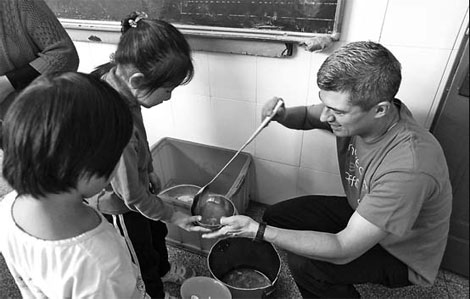Great education begins with nutrition
 |
|
Shawn Warren serves soup for students at Yongmei Primary School in Shanghai. Provided to China Daily |
Yang Zhen, 5, eagerly raises his right hand to answer the question his class has been posed. About 50 of his classmates, all smiling radiantly, are doing the same.
The question is about what and how much to eat in order to develop a healthy body.
It is a similar scene in the other classrooms at Yongmei Primary School, for migrant workers' children, in Minhang district, Shanghai.
Jing Jing and Tao Tao, who are posing the questions at the front of the classroom, are employees with Kraft Foods China.
"Every year since 2009, from Oct 3 to Oct 8, Kraft Foods China employees are encouraged to do community service," says Shawn Warren, president of Kraft Foods China.
The program, "Make a Delicious Difference Week", is aimed at fighting hunger and promoting healthy lifestyles in communities in need.
Warren says 30,000 Kraft Foods China employees from 60 countries signed up to volunteer this year.
In China, more than 1,000 Kraft Foods China employees went to rural schools, schools for children of migrant workers, and children's welfare homes in 13 provinces and cities, to share their knowledge about a balanced diet.
At Yongmei Primary School, after the lectures, volunteers from Kraft Foods China hand out cardboard blocks to groups of five or six students, and ask them to arrange the blocks to form a dietary pagoda, giving the basic principles of nutrition.
"The knowledge is new (to the students) and is delivered in an easily understandable way. The kids need this kind of knowledge, so do I," says Li Runmei, a Chinese teacher at the school.
"It's the first time I had heard of a 'dietary pagoda'."
But Kraft Foods China offers the kids more than just knowledge of food and some happy games - it also delivers a Hope Kitchen.
The school, which provides lunch to about 1,500 students every day, used to have a badly equipped kitchen of just 10 square meters.
The new kitchen has floor tiling, tables and chairs, refrigerators, a disinfection cabinet, and cooking utensils, such as a rice-steaming chart.
"All the work was done by them (Kraft Foods China)," Tao Duwen, the headmaster, says.
The kitchen upgrade was begun on Oct 1, when new furniture and equipment was delivered, and by Oct 8, everything was in place, for a total cost of 50,000 yuan ($7,883), Tao says.
Yongmei Primary School is the latest school to benefit from Kraft Foods China's Hope Kitchen program.
The program was initiated by the company and China Youth Development Foundation (CYDF) in October 2009, and aims to provide better nutrition for rural kids across China, as well as to improve the nutrition and food safety knowledge of rural teachers and kitchen staff.
Me Setso, a 14-year-old Tibetan girl, is one of the 150 boarding students at Fengduixiang Center School in Ledu county, to the east of Xining, capital of Qinghai province, and she is happy about the new catering arrangements.
"Now we have different vegetables and meat to eat, because we have fridges to keep them in," she says.
"In the past we were always eating potatoes and noodles, because they were easy to keep without a fridge."
"Having diversified food makes the kids healthier, so they can study better," says Li Changqing, headmaster of the school.
To date, more than 110 Hope Kitchens have been built in the provinces of Anhui, Yunnan, Jilin, Hunan, Hebei, and Qinghai, providing hot meals for more than 60,000 kids.
It is planned that by the end of 2011 more than 150 Kraft Hope kitchens will have been built, and another 50 in 2012.
"We really focus on two groups of kids in need, at rural schools and migrant workers' schools," Warren says.
"It's very clear from the work that we've done in partnership with CYDF that great education starts from great nutrition."
















